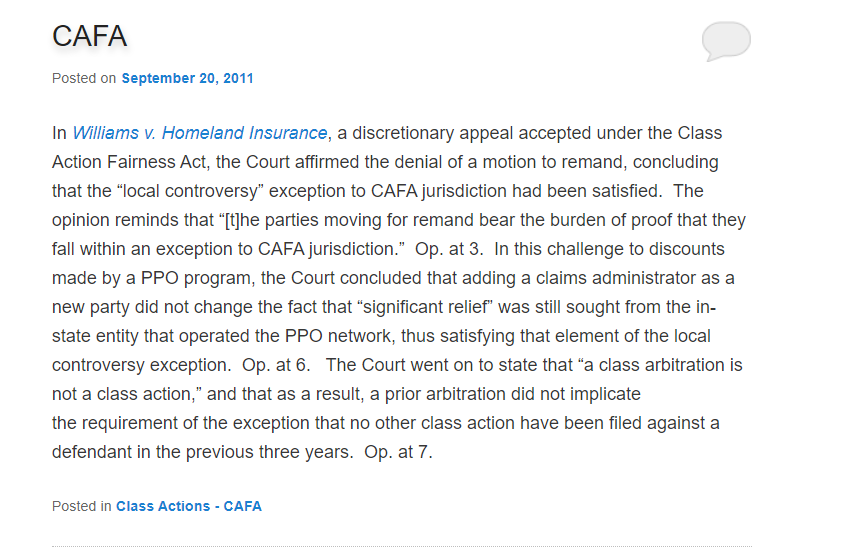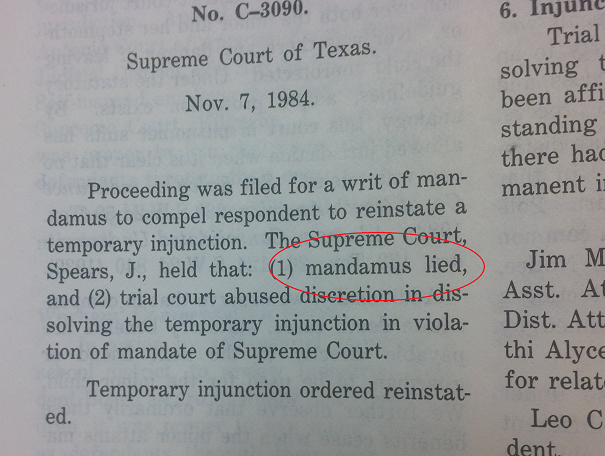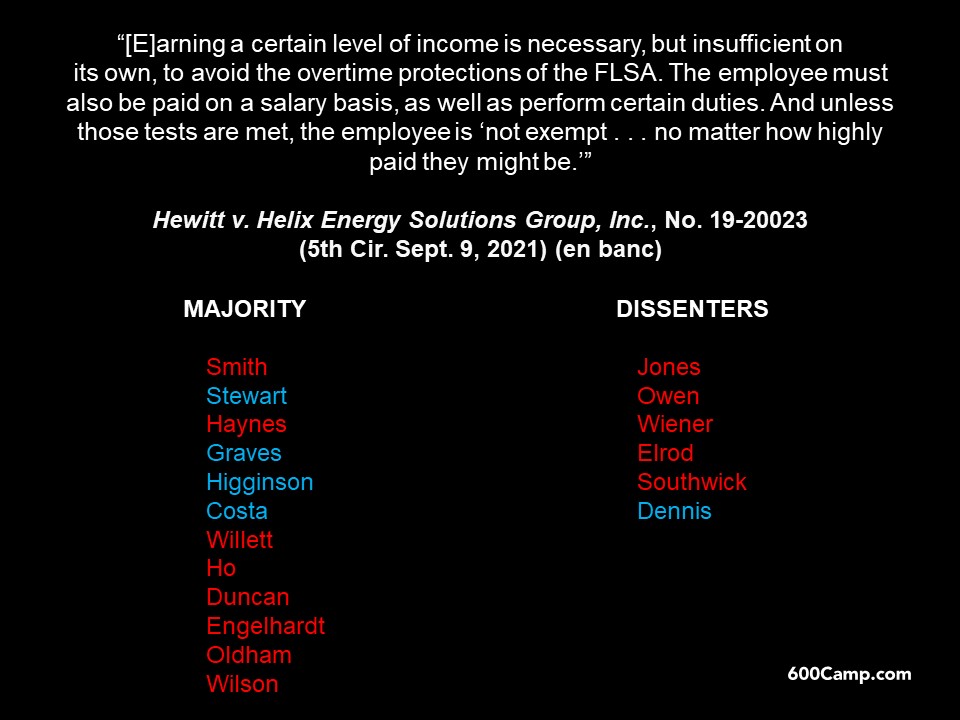“[T]he district court erred by failing to give notice to the parties. We ask, then, whether that error was harmless. Lexon argues that, had it received notice, it would have submitted different evidence of the value of its ‘lost collateral’—less than the full amount of the letters of credit. Lexon argues that the lost collateral, while perhaps not being worth the full value of the letters of credit, ‘had at least some economic value.’ However, Lexon never pleaded nor argued in the district court that its damages could be anything less than the full value of the letters of credit—$9,985,500. If the district court did not have an opportunity to rule on an argument, we will not address it on appeal.” Lexon Ins. Co. v. FDIC, No. 20-30173 (Aug. 2, 2021) (footnote and citation omitted) (emphasis added).
Monthly Archives: September 2021
 In Jungian psychology, the “Trickster” archetype (right) has been called “the embodiment of ambiguity.” In McDonnel Group, LLC v. Jung, LLC, the Fifth Circuit found an embodiment of ambiguity in an insurance policy provision that defined the flood-damage deductible as:
In Jungian psychology, the “Trickster” archetype (right) has been called “the embodiment of ambiguity.” In McDonnel Group, LLC v. Jung, LLC, the Fifth Circuit found an embodiment of ambiguity in an insurance policy provision that defined the flood-damage deductible as:
“5% of the total insured values at risk at the time and place of loss subject to a $500,000 minimum deduction as respects … FLOOD.”
The Court observed that “the plaintiffs read the deductible as saying ‘5% of the total insured values at risk … as respects FLOOD,'” and that “the insurers read the provision as ‘5% of the total insured values at risk at the time and place of loss, subject to a $500,000 minimum deduction … as respects FLOOD.” In other words: “[U]nder the plaintiffs’ theory, ‘as respects FLOOD’ modifies ‘total insured values at risk,'” while “[u]nder the insurer’s theory, ‘as respects FLOOD’ pertains only to the ‘$500,000 minimum deduction.'” The Court concluded that “[b]oth parties’ interpretations are reasonable, so the policy is ambiguous.” No. 20-30140 (Sept. 24, 2021).
 The United States successfully seized the M/Y Galactic Star, a valuable yacht, in connection with a massive bribery scheme involving Nigerian government officials. The Fifth Circuit agreed with the district court that the majority shareholder of the yacht’s corporate owner lacked standing to complain: “LightRay chose to maintain Earnshaw as a separate corporate entity, thereby securing all the attendant advantages of doing so, including an attempt by its principals to support the argument that LightRay is an innocent owner. We agree with the Eighth Circuit that ‘[a] court of equity will not disregard a corporation’s exclusive ownership of assets and claims ‘where those in control have deliberately adopted the corporate form in order to secure its advantages.’'” United States v. The M/Y Galactic Star, No. 20-20471 (Sept. 13, 2021) (citations omitted).
The United States successfully seized the M/Y Galactic Star, a valuable yacht, in connection with a massive bribery scheme involving Nigerian government officials. The Fifth Circuit agreed with the district court that the majority shareholder of the yacht’s corporate owner lacked standing to complain: “LightRay chose to maintain Earnshaw as a separate corporate entity, thereby securing all the attendant advantages of doing so, including an attempt by its principals to support the argument that LightRay is an innocent owner. We agree with the Eighth Circuit that ‘[a] court of equity will not disregard a corporation’s exclusive ownership of assets and claims ‘where those in control have deliberately adopted the corporate form in order to secure its advantages.’'” United States v. The M/Y Galactic Star, No. 20-20471 (Sept. 13, 2021) (citations omitted).
 Forby v. One Technologies presented the unusual situation of an arbitration waiver by the defendant, followed by an arbitration waiver the plaintiff as to a newly asserted claim: “We again address a class action claiming that One Technologies, L.P. (“One Tech”), duped consumers into signing up for ‘free’ credit reports that were not really free. The last time around, we ruled One Tech waived its right to arbitrate the plaintiffs’ state-law claims. Forby v. One Technologies., 909 F.3d 780 (5th Cir. 2018) [hereinafter Forby I]. Now, we consider whether One Tech also waived its right to arbitrate federal claims added after remand. Adhering to our precedent that waivers of arbitral rights are evaluated on a claim-by-claim basis, see Subway Equip. Leasing Corp. v. Forte, 169 F.3d 324, 328 (5th Cir. 1999), we hold that One Tech did not waive its right to arbitrate the new federal claims.” No. 20-10088 (Sept. 14, 2021) (citing, inter alia, Collado v. J&G Transp., Inc., 820 F.3d 1256 (11th Cir. 2016)).
Forby v. One Technologies presented the unusual situation of an arbitration waiver by the defendant, followed by an arbitration waiver the plaintiff as to a newly asserted claim: “We again address a class action claiming that One Technologies, L.P. (“One Tech”), duped consumers into signing up for ‘free’ credit reports that were not really free. The last time around, we ruled One Tech waived its right to arbitrate the plaintiffs’ state-law claims. Forby v. One Technologies., 909 F.3d 780 (5th Cir. 2018) [hereinafter Forby I]. Now, we consider whether One Tech also waived its right to arbitrate federal claims added after remand. Adhering to our precedent that waivers of arbitral rights are evaluated on a claim-by-claim basis, see Subway Equip. Leasing Corp. v. Forte, 169 F.3d 324, 328 (5th Cir. 1999), we hold that One Tech did not waive its right to arbitrate the new federal claims.” No. 20-10088 (Sept. 14, 2021) (citing, inter alia, Collado v. J&G Transp., Inc., 820 F.3d 1256 (11th Cir. 2016)).
 Despite the defeat of the Moorish armies in 732 by Charles Martel at the Battle of Tours (right), the appellants in Luminant Mining Co. v. PakeyBey asserted rights as cotenants to certain real property in East Texas as “’Moorish Americans’ who are ‘sovereign freemen under the Republic . . . .'” The Fifth Circuit affirmed judgment for the appellees, concluding: “[T]the PakeyBey parties contend that Luminant failed to demonstrate hostile possession vis-à-vis its cotenants. They assert that the record is devoid of evidence of actual notice of repudiation of the common title. They further contend that Luminant cannot show constructive notice of repudiation, arguing that constructive notice and ouster require more than Luminant’s demonstrated possession of the land and the absence of a claim against the land by Walling’s heirs. Their argument rests on a correct reading of the law, up to a point. (citation omitted) But Luminant’s possession and Luminant’s recorded deeds are sufficient to give constructive notice of hostility to cotenants and to effect an ouster.” No. 20-40803 (Sept. 17, 2021).
Despite the defeat of the Moorish armies in 732 by Charles Martel at the Battle of Tours (right), the appellants in Luminant Mining Co. v. PakeyBey asserted rights as cotenants to certain real property in East Texas as “’Moorish Americans’ who are ‘sovereign freemen under the Republic . . . .'” The Fifth Circuit affirmed judgment for the appellees, concluding: “[T]the PakeyBey parties contend that Luminant failed to demonstrate hostile possession vis-à-vis its cotenants. They assert that the record is devoid of evidence of actual notice of repudiation of the common title. They further contend that Luminant cannot show constructive notice of repudiation, arguing that constructive notice and ouster require more than Luminant’s demonstrated possession of the land and the absence of a claim against the land by Walling’s heirs. Their argument rests on a correct reading of the law, up to a point. (citation omitted) But Luminant’s possession and Luminant’s recorded deeds are sufficient to give constructive notice of hostility to cotenants and to effect an ouster.” No. 20-40803 (Sept. 17, 2021).
 Ten years ago, I posted a short note about a CAFA case (right); today, I make the 1,957th post on this blog. Tomorrow, I’ll make the 1,958th — blogging is a road traveled one case at a time. Publishing this blog has been a fantastic journey and I appreciate everyone who has shared the ride so far.
Ten years ago, I posted a short note about a CAFA case (right); today, I make the 1,957th post on this blog. Tomorrow, I’ll make the 1,958th — blogging is a road traveled one case at a time. Publishing this blog has been a fantastic journey and I appreciate everyone who has shared the ride so far.
To celebrate this anniversary properly, I observe three 600Camp traditions:
- Valuable 600Camp Merchandise. Anyone who catches an error in a post goes on the list to receive valuable 600Camp merchandise. Unfortunately I do not yet have any merchandise, but I assure you that all such commitments will be duly honored at the earliest possible time.
 Update on the M/V OCEAN SHANGHAI. The 2013 case of Farenco Shipping Co. v. Farenco Shipping PTE, Ltd. produced the best mootness argument of all time — a case about the seizure of a marine vessel became moot once the ship had sailed. The M/V OCEAN SHANGHAI, recently renamed as SFERA, has avoided the Fifth Circuit’s waters ever since; as of September 18, 2021, it was transiting the Laccadive Sea south of Sri Lanka (right).
Update on the M/V OCEAN SHANGHAI. The 2013 case of Farenco Shipping Co. v. Farenco Shipping PTE, Ltd. produced the best mootness argument of all time — a case about the seizure of a marine vessel became moot once the ship had sailed. The M/V OCEAN SHANGHAI, recently renamed as SFERA, has avoided the Fifth Circuit’s waters ever since; as of September 18, 2021, it was transiting the Laccadive Sea south of Sri Lanka (right).- Creole Recipe. The Fifth Circuit is blessed to be headquartered in the culturally rich city of New Orleans; to celebrate 600Camp’s birthday properly, I recommend the Artisanal Eggs Benedict at Brennan’s.
In light of the recent, intense debate about principles of “textualism” in Hewitt v. Helix Energy, it seemed a good time to revisit this classic meme:
The Fifth Circuit recently released its opinion on the emergency-stay motions of early September in the high-profile challenge to Texas’s “heartbeat law,” Whole Womens Health v. Jackson, No. 21-50792 (Sept. 10, 2021). In addition to identifying problems with the application of Ex parte Young, the Court observed: “We do not even take into account the many other justiciability defenses Defendants have raised beyond Young. Defendants have argued powerfully that, not only do they enjoy Eleventh Amendment immunity, but federal jurisdiction is also lacking under Article III. Related doctrines of standing, ripeness, and justiciability are also likely to prevail because these Plaintiffs have no present or imminent injury from the enactment of S.B 8.”
 In reviewing a claim of improper joinder, a court may “conduct a Rule 12(b)(6)-type analysis” to determine if the claim against the in-state defendant “is plausible on its face.”
In reviewing a claim of improper joinder, a court may “conduct a Rule 12(b)(6)-type analysis” to determine if the claim against the in-state defendant “is plausible on its face.”- Alternatively, if “discrete and undisputed facts . . . would preclude plaintiff’s recovery against the in-state defendant,” then “the district court may, in its discretion, pierce the pleadings and conduct a summary inquiry.”
- But, “unlike summary judgment, which can be granted when there is ‘lack of substantive evidence’ to support a plaintiff’s claim, improper joinder requires the defendant to ‘put forward evidence that would negate a possibility of liability on the part of ‘ the in-state defendant.
Accordingly, the Fifth Circuit reversed a finding of improper joinder in Hicks v. Martinrea Automotive Structures (USA), Inc., No. 20-60926 (Sept. 7, 2021), noting that the defendant’s argument about the tortious-interference element of malice “rel[ies] on evidence developed during merits discovery, which is far afield from Rule 12(b)(6) [and] the evidence they cite relates to the crucial question of Clark’s motive in terminating Hicks.” No. 20-60926 (Sept. 7, 2021).
The en banc court divided along atypical lines in Hewitt v. Helix Energy, a dispute about overtime-pay obligations for highly compensated employees in the oil-and-gas industry. The Texas Lawbook and Houston Chronicle have covered the opinion thoroughly; below is a chart showing which judges joined the majority opinion and which judges dissented in some way. Note that Senior Judge Wiener participated in this en banc case because he was part of the original panel.
Longtime observers of the Court may see echoes of the divided en banc court in Mississippi Poultry Ass’n v. Madigan, 31 F.3d 293 (5th Cir. 1994) (en banc), a dispute about the import of the word “same” in the Poultry Products Inspection Act.
 A chapter of the United Daughters of the Confederacy complained about the recent removal of a statue of a Confederate soldier from a San Antonio park. The Fifth Circuit affirmed the dismissal of its claim, observing (1) an 1899 document relating to the construction of the statue did not create a conveyance or use privilege for the relevant land; and (2) if it had done so, any such conveyance expired when an earlier chapter that actually received the document ceased operations in 1972, without conveying any such interest to its successor. Albert Sidney Johnston Chapter, Chapter No. 2060, UDC v. City of San Antonio, No. 20-50155 (Aug. 25, 2021).
A chapter of the United Daughters of the Confederacy complained about the recent removal of a statue of a Confederate soldier from a San Antonio park. The Fifth Circuit affirmed the dismissal of its claim, observing (1) an 1899 document relating to the construction of the statue did not create a conveyance or use privilege for the relevant land; and (2) if it had done so, any such conveyance expired when an earlier chapter that actually received the document ceased operations in 1972, without conveying any such interest to its successor. Albert Sidney Johnston Chapter, Chapter No. 2060, UDC v. City of San Antonio, No. 20-50155 (Aug. 25, 2021).
 There’s always “that” customer, who brings rude remarks and behavior along with repeat business. In Sansone v. Jazz Casino Co., No. 20-30640 (Sept. 1, 2021), “that” customer led to a prima facie case about a hostile work environment: “The unidentified Harrah’s customer frequently asked Sansone about her sex life and expressed his desire to sleep with her. He commented on her breasts and physical appearance and directed sexual gestures towards her. His comments were made in the presence of others and occurred at least two times a week for a significant period of time. This contrasts with instances where we have held a smaller stint within a lengthy period of employment was not sufficiently pervasive to support a hostile work environment claim.” (citations omitted, applying Farpella-Crosby v. Horizon Health Care, 97 F.3d 803, 806 (5th Cir. 1996)).
There’s always “that” customer, who brings rude remarks and behavior along with repeat business. In Sansone v. Jazz Casino Co., No. 20-30640 (Sept. 1, 2021), “that” customer led to a prima facie case about a hostile work environment: “The unidentified Harrah’s customer frequently asked Sansone about her sex life and expressed his desire to sleep with her. He commented on her breasts and physical appearance and directed sexual gestures towards her. His comments were made in the presence of others and occurred at least two times a week for a significant period of time. This contrasts with instances where we have held a smaller stint within a lengthy period of employment was not sufficiently pervasive to support a hostile work environment claim.” (citations omitted, applying Farpella-Crosby v. Horizon Health Care, 97 F.3d 803, 806 (5th Cir. 1996)).
“When reviewing for abuse of discretion, we will reverse a district court’s refusal to give a requested jury instruction ‘only if the instruction (1) was a substantially correct statement of law, (2) was not substantially covered in the charge as a whole, and (3) concerned an important point in the trial such that the failure to instruct the jury on the issue seriously impaired the [party’s] ability to present a given [claim].'” (citations omitted). In HTC Corp. v. Telefonaktiebolaget LM Ericsson, while the panel divided 2-1 about whether a requested instruction was accurate, all three judges agreed that the appellant was not “seriously impaired” at trial by its absence. No. 19-40566 (Aug. 31, 2021).
 CAFA creates an exception to federal class-action jurisdiction if, among other requirements, “the primary defendants[] are citizens of the State in which the action was originally filed.” Recognizing a lack of clear authority about the meaning of “primary defendant,” the Fifth Circuit reasoned that “there is much to commend the [Third Circuit’s] emphasis on the ‘real target’ of the litigation and [this Court’s] description of the controversy’s ‘primary thrust.'” Madison v. ADT, LLC, No. 21-90028 (Aug. 24, 2021).
CAFA creates an exception to federal class-action jurisdiction if, among other requirements, “the primary defendants[] are citizens of the State in which the action was originally filed.” Recognizing a lack of clear authority about the meaning of “primary defendant,” the Fifth Circuit reasoned that “there is much to commend the [Third Circuit’s] emphasis on the ‘real target’ of the litigation and [this Court’s] description of the controversy’s ‘primary thrust.'” Madison v. ADT, LLC, No. 21-90028 (Aug. 24, 2021).
“We are … persuaded that, under Texas law, undercapitalization alone would not be sufficient to pierce the corporate veil.” Ledford v. Keen, No. 20-50650 (applying, inter alia, Ramirez v. Hariri, 165 S.W.3d 912, 916 (Tex. App.–Dallas 2005, no pet.)).


